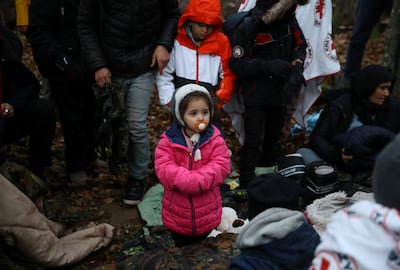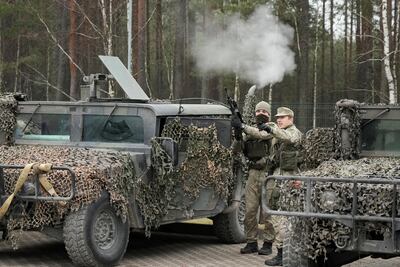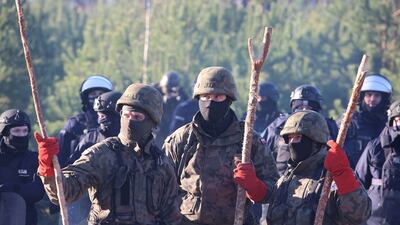Why is there a crisis in Belarus?
Thousands of migrants have in recent months tried to cross from Belarus into EU countries Poland, Lithuania and Latvia.
Belarus has been accused of orchestrating this to undermine the EU and retaliate against sanctions the bloc imposed on the country’s government.
The EU says it is facing a “hybrid attack” on its eastern flank and that Belarus, an ally of Russia, has carried out “gangster-style” behaviour.
The crisis had been simmering since the summer but escalated this week when hundreds of people tried to push their way into Poland.
Why is Belarus at odds with the EU?
Belarus has faced several rounds of EU sanctions linked to President Alexander Lukashenko’s disputed election victory last year and a subsequent crackdown on dissent.
Some countries have rejected the election result and many opponents of the regime have been arrested or fled the country.
Tensions increased again in May when an opposition journalist was arrested in Minsk after his plane was forced to land owing to a dubious bomb threat.
Belarus’s security guarantor and main political backer is Russia, which itself is under EU sanctions.

Who are the migrants?
Many are from Iraq, where authorities stopped flights to Belarus owing to pressure from the EU. Other migrants are from countries such as Syria, Cameroon and the Democratic Republic of the Congo.
They have sought to enter the EU through Eastern Europe, it is believed that many want to move on to Germany.
The Polish military estimates that between 3,000 and 4,000 migrants have gathered at the border, including about 800 near makeshift camps.
European leaders have emphasised that the door is not closed to so-called irregular migrants and say Belarus has exploited them by giving them false hope of a better life.
How have Poland and the EU responded?
Poland declared a state of emergency at the border and sent troops and border guards to keep migrants out. The government has sent text messages telling migrants the border is closed.
A barbed-wire fence has been installed along parts of the border and Poland plans to build a wall.
Lithuania and Latvia, which also share borders with Belarus, increased security after some migrants tried to enter the countries.
The EU has tightened sanctions on Belarus and offered political backing to Poland, despite the bloc's row with Warsaw over democracy and the rule of law.
But Brussels has rejected calls for EU funding to be used to build border fences in Poland, Latvia and Lithuania.
Humanitarian groups have criticised Poland’s treatment of the migrants, saying guards beat them and use tear gas to force them back into Belarus.
Several deaths have been reported at the border, although that has been difficult hard to verify. The state of emergency kept people out of the border area in Poland, and journalists have limited access in Belarus.

How has Belarus responded?
Belarus denies the accusation that it is shepherding migrants towards the border and has accused Poland of escalating the situation.
"We would like to warn the Polish side in advance against any provocations directed against the Republic of Belarus," the Belarusian Foreign Ministry said.
Belarus has seized on allegations of beatings by Polish border guards to cast EU countries as the villains in the stand-off.
What could happen next?
There are concerns about a humanitarian crisis if migrants are left stranded in freezing temperatures over the winter months.
The UN’s migration and refugee agencies say it is “imperative to prevent further loss of life” and for aid workers to be allowed to reach the migrants.
Poland expressed fears of an armed confrontation. It said the “security of the entire EU is at stake” as the number of migrants swells.
The EU has called for further sanctions on Belarus, including on airlines the bloc says are engaged in human trafficking.
Meanwhile, Minsk has turned to Moscow for support, with talks on Wednesday leading to discussion of a “joint response” with Russia.
Mr Lukashenko said he did not want a conflict but would not back down in the stand-off.
“I am not a madman. I understand perfectly well where it can lead ... but we will not kneel,” he said.


